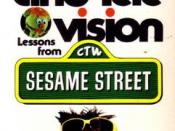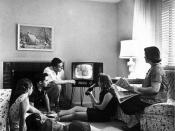When television began great hopes and great fears arose concerning what it effects might be. With the flip of a switch, Americans could bring the world into their homes. Americans wondered if it would corrupt children with too much crime and violence. Nor did the parents imagine the number of hour's children would spend watching television. Television influences children both good and bad everyday. Children watch their favorite shows each week on it everyday. Parents watch the news on it every night and we settle down in front of it for the weekend movie. Good and bad television affects children in many different ways; three of these ways are violence, educational, and health problems.
First of all, TV programs for children features more violent acts per hour than a decade ago, negative effects on children's development are greater (Murray, 1998). Many times we hear, "I've seen this done on TV".
Famous last words, the explanation of children when asked about their wrong actions. Next to the family television may be the most important source of information for children. Three problems associated with heavy viewing of television violence: 1.) Children become less sensitive to the pain and suffering of others. 2.) Children become more fearful of the world around them. 3.) Children may be more likely to behave in aggressive or harmful ways toward others (Carter, 1997). Exposure to violence leads children to see violence as a normal response to stress and as an acceptable means for solving conflicts, they are less likely to benefit from creative, imaginative play as the natural means to express feelings, overcome anger and gain self-control.
Research shows that children between the ages of two and eight years of age are very vulnerable to violence on television because they are unable to separate what they seen...


